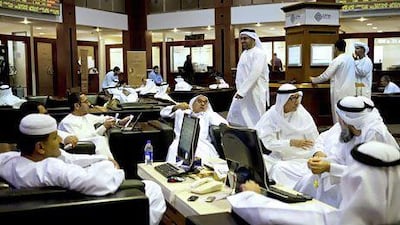Investors are bracing for a roller-coaster ride after shares listed on the UAE bourses started to fall this week after an aggressive rally.
The correction came after weeks of strong gains amid expectations of an upgrade to emerging markets status by the international index compiler MSCI.
"The market is overheating," said Mohammed Ali Yasin, the managing director at National Bank of Abu Dhabi's brokerage arm. "The problem is that the new liquidity is bloating like a balloon. We should have had a few IPO's during this time to suck it all out." The markets have benefited from a trading bonanza over the past year, amid renewed investor interest, boosted by a strong economic recovery and an uptick in merger and acquisition activity in blue-chip companies.
The Dubai Financial Market General Index has climbed 55.5 per cent so far this year, while the Abu Dhabi Securities Exchange General Index has advanced 57 per cent in the same period.
The UAE is under review next week for a potential upgrade from its current frontier status by MSCI, whose indexes are tracked by investors managing US$7 trillion of clients' money. Analysts at HSBC said there were "mildly positive" signals for a reclassification of the UAE bourses - the Abu Dhabi Securities Exchange, Dubai Financial Market and Nasdaq Dubai.
They "have begun to address their respective market accessibility issues in an attempt to satisfy global investor needs," HSBC's Vijay Sumon and Joaquim de Lime said in a note to clients.
The UAE market rally was led earlier this year by institutional investors, who bought up banking stocks ahead of the first quarter earnings season.
Retail investors soon followed, buying up laggard stocks and seeking to make a quick profit on the back of re-ignited interest in the markets.
Dubai Investments, Gulf Navigation and Tabreed, which are traditionally traded by retail investors, are among the top 10 traded.
"That's the sign of a market that is being driven by speculators rather than long-term investors," Mr Yasin said.
Traded value in Dubai rose to a crescendo of 895.7 million yesterday, from a 50-day average of 533.9 million. On Tuesday, however, the markets reversed their direction.
"Everybody expected markets to correct," said Tariq Qaqish, the head of asset management at Al Mal Capital in Dubai.
"It should be considered a healthy correction. The retails are panicking because they have exposure with leverage amounts but the institutionals are looking for opportunities to accumulate in any weaknesses."
They recovered yesterday as investors bought up shares in Dubai Financial Market Company, the Dubai bourse's shares.
The stock rose 3.5 per cent yesterday to close at Dh2.03. It has risen over 40 per cent since May 26 amid speculation over a potential merger first mooted three years ago.
The market regulator, the Securities and Commodities Authority, in addition to the ADX and DFM declined to comment when contacted by The National earlier this week.

